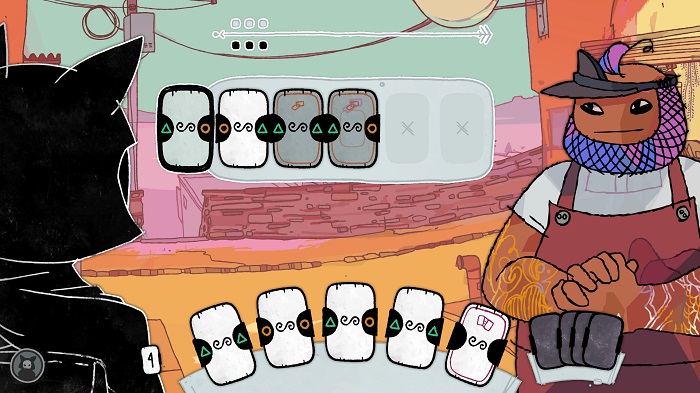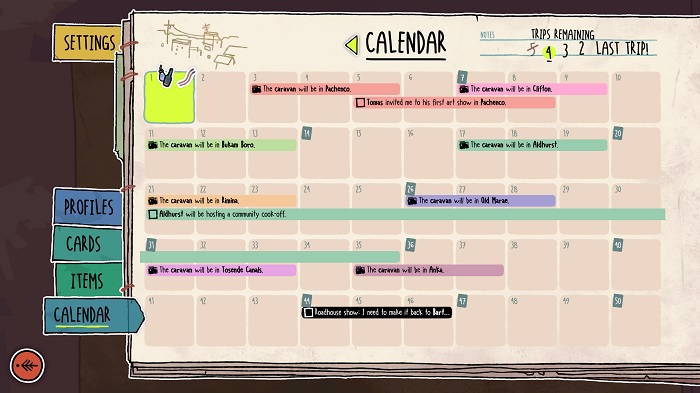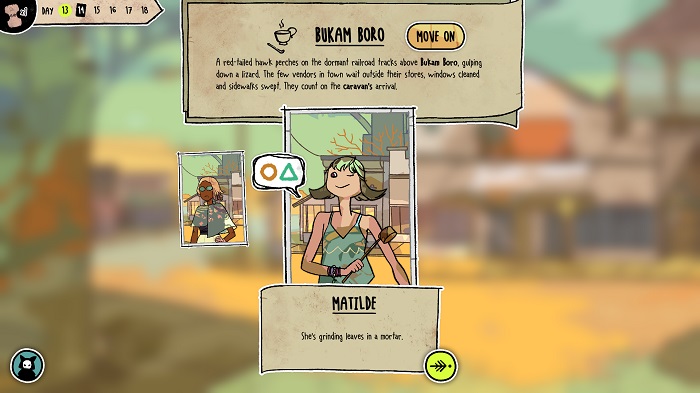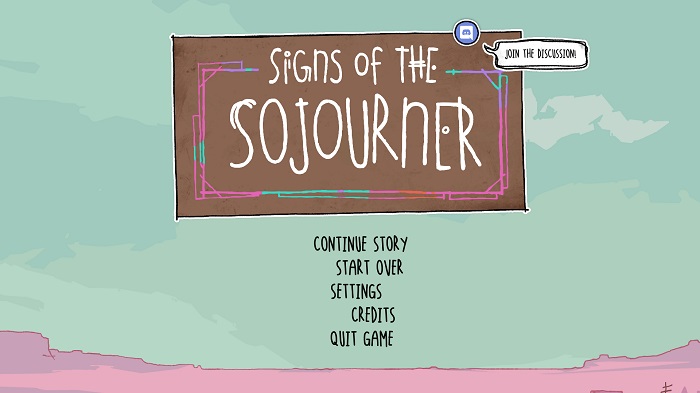Subjective:
Echodog Games, acting as both developer and publisher, present Signs of the Sojourner (simply Sojourner for the remainder of this piece) for review. Sojourner puts players into the walking boots of an unnamed feline-adjacent protagonist. They recently inherited a shop from their deceased mother and are initially tasked with procuring supplies to sell. Connections may be formed with different people that lead to new sources of information about the land and their mother.
Objective:
Sojourner is neatly split between three modes of point-and-click engagement. The first is dialogue to read, second is a card game where matching – or failing to match – symbols move the conversation forward, and third is clicking through a map to plot a course. The card game will take up the most time and involves a hand of five cards played in a pseudo-cooperative fashion with the other person. Matching symbols allows the conversation to move forward concordantly or discordantly. These aren’t explicit win or fail states as, even in discord, the player may pick up additional information to open new routes or learn about different locations.
The player will also pick up fatigue the more they’re on the road which puts cards in the deck which match against nothing. Making the most progress involves learning how different shield, special effect, and anti-fatigue cards to have as many concordant conversations as possible for the most items to sell and information to pick up. There is a time limit but no restriction on where the player may go. So each playthrough can yield entirely different destinations, characters, and revelations.

Assessment:
There are moments of remarkable flow toward the late game of Sojourner. Multiple symbols representing different emotional impulses should clash and end conversations. But through careful use of accord shields, redrawing my hand, chatting away to drop multiple cards, and peering into the opposing conversationalist’s hand I create a tiny symphony of concordance. These moments, which would have ended in absolute failure earlier in my adventure, showcase just how much I’d come to understand the systems while learning to integrate them into my actions fully.
What brought that flow down, and hampers an experience that’s frustratingly close to excellence, is my lack of presence in Sojourner‘s world. I am a collection of symbols to be played instead of a person to interact with. This collides with the very solid personalities of the many characters that fill Sojourner‘s towns.
I am made constantly aware of this emptiness. This game is symbol matching, and I am mute as someone tells me of their dead friend or why they’re overcompensating for some perceived fault in themselves.

Empty protagonists are nothing new, but the one in Sojourner has enough conflicting details filled in by others to hinder existing anonymously in this world. Conversation partners often shift their moods drastically between sentences. They’ll tell me little details about their day one second, the next wondering why I’m so angry, and conclude by thanking me happily for the time. There is almost no connecting thread between the responses of the conversation partners because there is no personality there to respond to. Abstracting conversation to symbols is a great idea, but when the conversation on the other end is not similarly abstracted the disconnect between what they are saying and what I am playing will never be reconciled.
There’s a great sociological point here about how the way we develop communication systems struggle to interact. Sojourner does not benefit as a game by having only one side’s struggle visible throughout the different conversations. It works well when I’m playing against / with characters who speak in simple emotion-packed expressions. They’re already an open book of feeling so my symbolic responses take on more weight as they aren’t filtered through the always shifting system of language. The more complex the character, the less satisfying the game since my avatar’s total lack of response outside the symbols creates confusion over just what I am.

Sojourner is still a great pill of relaxation when learning the system or during those later game periods of complicated bliss. While there’s not much personality in response, there is a lot of personality in the edges and curves of the different characters. They’re so expressive that they further fuel my desire to have a version of Sojourner that keeps the scenario but jettisons the dialogue. It would have a great soundtrack ready to accompany the newly dialogue-liberated game with a shifting lead instrument taking point along each twist of the road.
Signs of the Sojourner was reviewed using a reviewer-purchased copy of the code on PC through the Itch.io Bundle for Racial Justice and Equality.
The Review
Signs of the Sojourner
The disconnect between symbolic dialogue and exact responses is not enough to sink Sojourner. It would have been a death sentence to a lesser game, but Echodog Games' card conversation system is so entrancing that even its lesser moments of beauty are still more than most other games can accomplish. A little bit more courage in the symbols, and less in the dialogue-response specifics, would complete the transition from strong curiosity to one-of-a-kind experience.
PROS
- Getting lost in symbols as dialogue is sociologically rich with potential. And during Signs of the Sojourners best moments it highlights how beautiful our mutual understanding can be considering the obstacles that hinder communication. An expressive aesthetic and open-ended gameplay keep the core experience powerful.
CONS
- A nearly fatal flaw in having the player-controlled avatar be so blank and the responding characters so verbose. Abstracted emotional states on both ends would have been more connective than having complex conversation only returned but never delivered.



